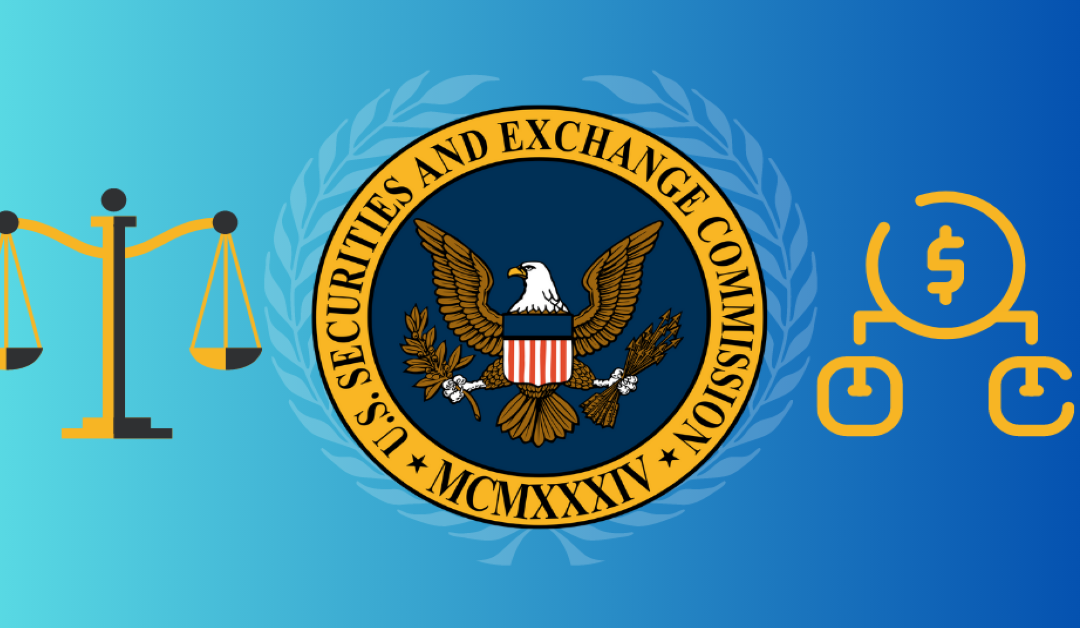
by Samuel Mbaki | Jun 13, 2023 | Regulation
Key Points
- Ripple CEO Bradley Kent Garlinghouse hints that the crypto community should eagerly await Hinman documents.
- SEC and Ripple court battle takes a new twist as judge orders release of documents that could tip the case in Ripple’s favor
Ripple CEO positive about Hinman’s documents
On June 13, 2023, Ripple CEO Bradley Kent Garlinghouse tweeted, assuring the crypto community that upcoming Hinman’s documents are worth the wait. He hinted that the documents could play a huge role in tipping the case in Ripple’s favor and concluding it.
Its only one day left for the Hinman documents to get unsealed, and the crypto community is already showing uproars and eagerness to see them. The SEC had been fighting for the court to lock the public out of seeing the documents for over 18 months.
With only a day left to the unsealing date, Ripple executives CEO Brad Garlinghouse and Chief Legal Officer Stuart Alderoty see it as worth the wait. The documents concern SEC messages on a 2018 speech by former director William Hinman. In the speech, Hinman says that cryptocurrencies such as Bitcoin and Ether may start as securities but become commodities when sufficiently decentralized.
Ripple advocates and investors believe that the imminent unsealing of documents will be instrumental in providing further insight into the legal status of Ripple’s XRP token. The timing of the unsealing of these documents couldn’t be more opportune as it comes at a time when the SEC is pressing on with crackdowns against crypto exchanges for trading crypto assets that stand as securities.
Keep watching Fintech Express for more updates on crypto and other fintech-related developments.

by Samuel Mbaki | Jun 13, 2023 | Banking
Key Points
- China’s Central Bank slashes its seven-day reverse repurchase rate by 10 basis points from 2% to 1.9%
- Onshore Chinese Yuan devalues by 0.25% to 7.1618 against the U.S. dollar
- Further monetary easing lies ahead of China as Central Bank cut deposit rates
People’s Bank of China revises monetary policies as the economy takes a hit
China is in for an easier time as the People’s Bank of China (PBOC) reverses key monetary policies. The bank cut a key short-term policy following disappointing data from the economy after the nation failed to rise as expected following the Covid-19 reopening.
PBOC has slashed its seven-day reverse purchase rate by 10 basis points, taking it from 2% to 1.9%. According to a press release by the bank, the move in jects 2 billion Chinese yuan ($279.97 million) through its seven-day repos.
This move marks the first time the Chinese government has made such a policy since August 2022. It comes ahead of the PBOC’s medium-lending facility interest rate decision that is slotted for June 15, 2023. The bank’s loan prime rate is also scheduled for release on June 20.
“Now we are going to see the Chinese [monetary] policy will become more supportive,” Atlantis’ Chief Investment Officer Yang Liu told CNBC’s “Street Signs Asia.”
“Basically what the Chinese government is [expected] to do [is] to try very hard to prop up the domestic consumption, especially in the private sector,” she said.
Keep watching Fintech Express for more updates on banking and other fintech-related news and developments

by Samuel Mbaki | Jun 12, 2023 | Cryptocurrencies
Key Points
- Tether has minted another $1B worth of USDT
- Tether CTO says that the money is necessary to facilitate chain swaps
- The new 1B USDT coins take the total tally of the coins minted by Tether in 2023 to over $16B
Tether CTO says the newly minted $1B is for chain swaps
Tether CTO Paolo Ardoino has taken to Twitter to clarify why the issuer has minted a billion USDT. He says the new coins will facilitate chain swaps and won’t mix with the issued market cap.
Tether CTO Paolo Arddoin said that the amount is authorized but not issued. Therefore, the amount will be spent as an inventory for the next period of issuance requests and chain swaps.
A chain swap is a process where traders can transfer digital assets from one blockchain to another. For instance, you can swap USDT on the Ethereum network to Binance or Tron networks. This trader allows investors to access perks from different networks supporting the coins they hold.
Regarding the development, Tether CTO Ardoino explained that the company periodically works alongside different crypto platforms to help rebalance the liquidity of USDT across various blockchains. For instance, a platform could see a growing demand for USDT on the Tron network than the Ethereum network, necessitating a rebalance of the available USDT balances to serve the clients right.
By now, Tether has minted over $16B in 2023. It remains the world’s largest stablecoin and is pegged to the dollar. The stablecoin also brags a market capitalization of $83B, which takes its dominance out of reach of many crypto assets.
In other news, Tether has been spending part of its profits investing in Bitcoin with green mining plants set up in Uruguay and purchasing Bitcoin Bonds of El Salvador.
Keep watching Fintech Express for more updates and news on crypto, blockchain, and other fintech-related fields.

by Samuel Mbaki | Jun 12, 2023 | Banking
Key Points
- UBS completes take over of Credit Suisse days after signing a loss protection agreement with the Swiss government
- The bank is set to have an enlarged balance sheet of $1.6T and a workforce of over 120K
UBS becomes the new owner of Credit Suisse and its assets
UBS, a Swiss banking giant, has completed the takeover of Credit Suisse following its collapse in March 2023. The bank will now be in charge of a balance sheet worth over $1.6T and a workforce of around 120K professionals.
The news comes days after Fintech Express reported that the bank had completed a deal with the Swiss government for loss protection. On June 12, 2023, the bank said it had completed the deal and looked forward to the next chapter in its business journey and history.
“Instead of competing, we’ll now unite as we embark on the next chapter of our joint journey,” UBS Group’s new CEO Sergio Ermotti said in a statement.
UBS group is set to manage the two banks as separate entities in the short term while assessing options for the future of Credit Suisse’s assets for the future. In an open letter, Credit Suisse chiefs said they would not also want to compromise the string work culture at UBS or its conservative risk approach.
The Swiss banking giant said that it expects the operating losses and significant restructural changes at Credit Suisse to be offset as it seeks to ditch risk-weighted assets. It added that it foresees a common equity tier 1 capital ratio of around 14% for the remaining part of the year.
Keep watching Fintech Express for more updates on Banking and other fintech-related news and developments.

by Samuel Mbaki | Jun 12, 2023 | Blockchain
Key Points
- Ethereum co-founder and core developer Vitalik Buterin has stated layer 2 scaling, wallet security, and privacy-preserving features as the three key features to support Ethereum’s future.
- He added that a misfit in either one of the three features could spell doom on the network.
- Vitalik Buterin also asked developers to keep building.
Ethereum fails without these three pivots: Vitalik Buterin
Vitalik Buterin, Ethereum network co-founder and core developer, has outlined wallet security, layer 2 scaling, and privacy-preserving features as key Ethereum pivots. In a June 9, 2023 post from his blog, Vitalik Buterin expressed that the Ethereum network outright “fails” without either of the features.
He started with scaling issues, saying that layer 2 scaling keeps the network uncongested, highly competitive, and affordable. He said that without l2 protocols, the fees would be exorbitantly high, leading to a collapse in the ecosystem due to unaffordability and low transaction speeds.
An excerpt in the blog post reads.
“Ethereum fails because each transaction costs $3.75 ($82.48 if we have another bull run), and every product aiming for the mass market inevitably forgets about the chain and adopts centralized workarounds for everything.”
On smart contract wallets, Vitalik Buterin said that a move to institute them in the network has resulted in some issues due to complexities from user experience as users take control of multiple addresses all at once. He expounded that these wallets must secure data to truly transition into an on-chain world with zero-knowledge rollups:
“In a ZK world, however, this is no longer true: the wallet is not just protecting authentication credentials, it’s also holding your data.”
The last of his three pivots of the Ethereum blockchain came in the form of privacy-preserving features. Vitalik said these features must bring improved identity, reputation, and social recovery systems for users to experience improved security.
An excerpt from his blog reads:
“Without the third, Ethereum fails because having all transactions (and POAPs, etc) available publicly for literally anyone to see is far too high a privacy sacrifice for many users, and everyone moves onto centralized solutions that at least somewhat hide your data.”
He suggested the use f stealth addresses for the issue. Vitalik Buterin has expressed that getting all three pivots of the blockchain up and running will be challenging as “intense coordination” is required between them.
He added that realizing this goal is still afar as it would be tiresome to acquire information on how to pay someone, unlike using one address model. As such, he concluded the need for developers to keep working and figure out how to develop an infrastructure that ultimately improves user experience.
Keep watching Fintech Express for more updates on crypto and fintech-related developments.

by admin | Jun 12, 2023 | Regulation
Key Points
- Democratic leaders in the United States seem to be forming a fight against crypto
- Winklevoss twins believe that the move by these lawmakers might see them losing critical votes in 2024
- The crypto community keeps feeling undermined in the U.S. and is weighing its options
Winklevoss twins believe that Democrats are on track to miss out on crypto votes
Winklevoss twins believe that Democrats are on the wrong side of crypto regulation, which may make them lose key votes in 2024. The two crypto investors believe that the ongoing ‘crypto crackdowns’ and open show of dissatisfaction with crypto innovations led by Democrats might make many voters favor their opponents.
One of the Winklevoss twins, Cameron, tweeted on June 11 calling out Senator Elizabeth Wallet for her continued pressure to call for an ‘army’ to rise against crypto. He quoted an article from CNN that states, “Democrats would have gotten crushed this election without young voters.”
In his claims, Cameron says that young voters are most likely involved or interested in the crypto innovation, which makes it a poor choice for Democrats to go to war with the industry. Cameron said that Warren and Gary Gensler going after crypto with prejudice would align an entire generation of would-be Democrats.
Soon after, his twin Tyler tweeted that Warren and Gary Gensler would cost Democrats their positions in 2024.
These tweets by the Winklevoss twins come at a time when SEC’s Gary Gensler says he does not think the U.S. needs any more crypto assets. He added that he believes crypto is built on non-compliance, saying it doesn’t want to comply with set rules like securities laws.
His comments come when he seeks to give the SEC control over 60+ crypto assets claiming they are securities. The regulators are already suing Binance and Coinbase regarding trading assets in its 60+ list in the U.S. without its clearance. It also has a court battle going on with Ripple over XRP.
These efforts by the SEC to make the market ‘safer’ for American investors have been received by a rather unhappy crypto industry. Some people call for the community to pull efforts and challenge the regulator in court, while others warn of companies leaving the U.S., which is already happening with Bittrex and Coinbase looking for offshore crypto-friendly destinations.
As such, crypto is expected to be a major weighing point in the upcoming 2024 elections, making it necessary for Democrats to switch sides per Winklevoss twins. Keep watching Fintech Express for updates on crypto regulation and other fintech-related news and developments.

by Samuel Mbaki | Jun 12, 2023 | Blockchain
Key Points
- Sturdy Finance, a popular DeFi lending protocol, has been compromised by crypto attackers.
- The attackers made away with around $800K
Crypto hackers strike again; Sturdy Finance affected
Sturdy Finance, a well-known Decentralized Finance lending protocol, has fallen prey to hackers that managed to drain $800K. The platform has responded by saying that it has paused all markets and no further funds were at risk.
The attackers managed to drain 442 Ethereum, worth around $800K at the time of writing, after discovering a security loophole in its systems and exploiting it. They took advantage of the vulnerability that allowed them to manipulate a faulty price Oracle hence draining funds from the protocol.
The event was first noticed by onchain security firm PeckShield alert that went ahead to alert Sturdy Finance. Peckshield noticed anomalies within the transactions being made in the platform as they knew that Sturdy Finance had to be compromised as the transactions showed price manipulation signs.
About an hour later, Sturdy Finance said that they had been aware of the vulnerability and were working on it first by pausing all markets to hinder the continued outflow of further resources to the attacker’s loot.
Despite the efforts, the attacker had already transferred the monies to the Tornado Cash crypto mixer, making it harder to continue tracking it. This attack against Sturdy Finance comes when the crypto space sees increased cyber attacks. Recently, BitBoy, a popular crypto influencer, had his Twitter account hacked to promote scam projects.
Crypto detective Zach XBT says that scammers have made away with almost a million dollars by taking control of social media accounts belonging to popular individuals like Pudgy Penguins, Peter Schiff, Steve Aoki, and many others. As such, crypto investors should be more careful when dealing with the industry to protect themselves from such events.
Keep watching Fintech Express for updates on crypto and other fintech-related stories and developments.

by Samuel Mbaki | Jun 9, 2023 | Regulation
Key Points
- SEC chairman has explained that the regulator had a meeting earlier this week where they discussed and introduced two more rules for Swap Markets
- He also says that the regulator has adopted a set of final rules to remove references to credit ratings from Rules 101 AND 102 of Reg M per a mandate by Congress in the wake of the 08 financial shakedown.
Swap markets need more attention, says SEC chair
SEC chair Gary Gensler has announced the introduction of more rules for Swap Markets. He says investors need more protection as misconduct in such markets could affect many involved parties.
In a Twitter post, Gary Gensler says that the regulator saw it fit in their latest meeting to introduce two more rules in the Swap markets. In his words, Gnsler said:
“Any misconduct in the security-based swaps market noit only harms direct counterparties but also can affect reference entities and investors in those reference entities. Given these markets size, scale and importance, it is critical that the commission protect investors and market integrity through helping prevent fraud, manipulation, and deception relating to security-based swaps. Today’s rules will do just that.”
He added that they also adopted a set of final rules to remove references to credit ratings from Rules 101 & 102 of Reg M, fulfilling an important mandate issued by Congress in the wake of the ’08 financial crisis.
Keep watching Fintech Express for updates on financial regulation and other fintech-related developments.

by Samuel Mbaki | Jun 9, 2023 | Regulation
Key Points
- Mica has been published in the E.U. official journal.
- The crypto legislature will take effect by the end of 2024 to create a unified crypto assets regulation in the European Union Member States.
MiCA crypto regulations added to E.U. official journal- the countdown to effect starts.
E.U. has published MiCA regulations in its official journal, kickstarting the countdown to them taking effect by the end of 2024. These regulations have been in development over the past few years. They will play a big part in harmonizing crypto regulations in the region, as all European Union member states will be using them.
The European Union Markets in Crypto Assets (E.U. MiCA) legislation was published on June 9, 2023, triggering the count down to December 30, 2024, where it should be effected. This bill was signed into law on May 31. Still, it has been agreed upon by the E.U. lawmakers to give the crypto industry time to read and digest them before they are effected to avoid bringing hasty regulation that may send innovation away from E.U. member states.
The crypto industry has hailed the E.U. for introducing the proper regulatory framework in the area, unlike the U.S., which charges exchanges without having put in similar efforts first.
Today, Binance’s CEO praised the European Union for the legislation and said that since there is a new framework in Europe, his exchange and others will have time to adequately adjust and adhere to it to serve both the law and the investors.
In the meantime, crypto organizations are getting under fire in the U.S. as SEC is going hard after them. By now, Bittrex and Kraken have been charged with ongoing court proceedings for Ripple, Coinbase, and Binance. These organizations are being sued for offering securities assets to U.S. citizens without the ‘knowledge’ of the SEC.
Keep watching Fintech Express for updates on crypto regulation and other Fintech-related developments.

by Samuel Mbaki | Jun 9, 2023 | Technology
Key Points
- Bipartisan bills targeting government AI usage have been tabled by U.S. senators.
- One of the bills seeks to form a new office of Global Competition Analysis aimed at helping the U.S. maintain its lead in innovation.
U.S. senators seek to bring transparency and innovation to America via AI
U.S. Senators have introduced a bipartisan bill to increase the transparency behind AI usage and foster innovation. The first bill was tabled on June 8 by Democratic Senator Gary Peters and Republican Senators Mike Braun and James Linkford.
Their bill requires the government to be transparent about how it uses Artificial Intelligence (AI). If passed, governmental organizations would be required to give an account of when and how it interacts with AI to the public, along with a system of appeal for citizens to engage in decisions made using Artificial Intelligence.
Regarding the bill, Senator Mike Braun stated:
“The federal government needs to be proactive and transparent with AI utilization and ensure that decisions aren’t being made without humans in the driver’s seat.”
The second bill was introduced by Democratic Senators Michael Bennet and Mike Warner alongside Republican Senator Young Todd. This bill seeks to establish an office of Global Competition analysis. This new office will be helpful for the U.S. to keep ahead of the curve with emerging technologies and innovation.
It comes at a time when the general public is concerned about the efforts to help the country maintain its lead in innovation basis. Regarding the bill, Senator Michael Bennet said:
“We cannot afford to lose our competitive edge in strategic technologies like semiconductors, quantum computing, and artificial intelligence to competitors like China.“
These bills come after Senate Majority Leader Chuck Schumer called for three briefings to educate lawmakers on Artificial Intelligence (AI) matters. These efforts by U.S. Senators come when the world is trying hard to advance in the industry, thus making them strategic.
Earlier this week, the U.K. stressed the need for stricter AI regulations, which would typically be at the same grade as nuclear weaponry and Medicine. Elsewhere, major governments like China and Russia have kept their cool on the matter, but that doesn’t mean they couldn’t be researching it.










